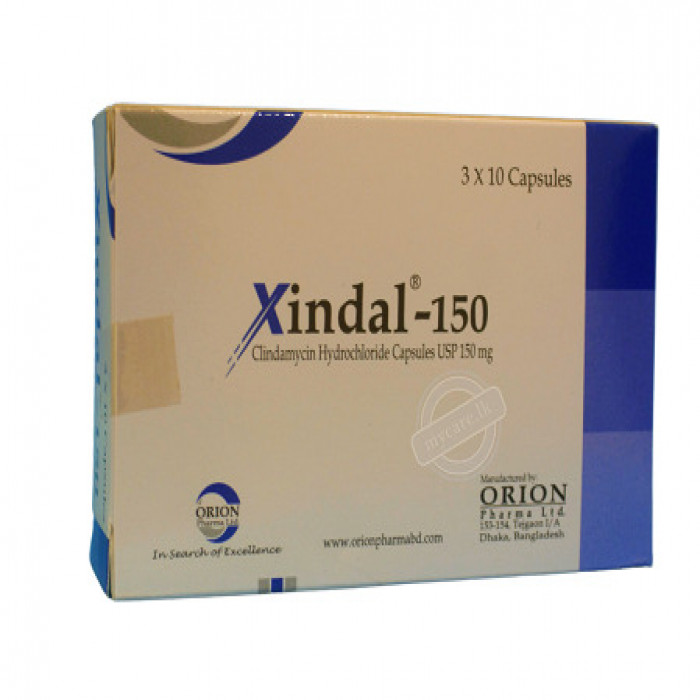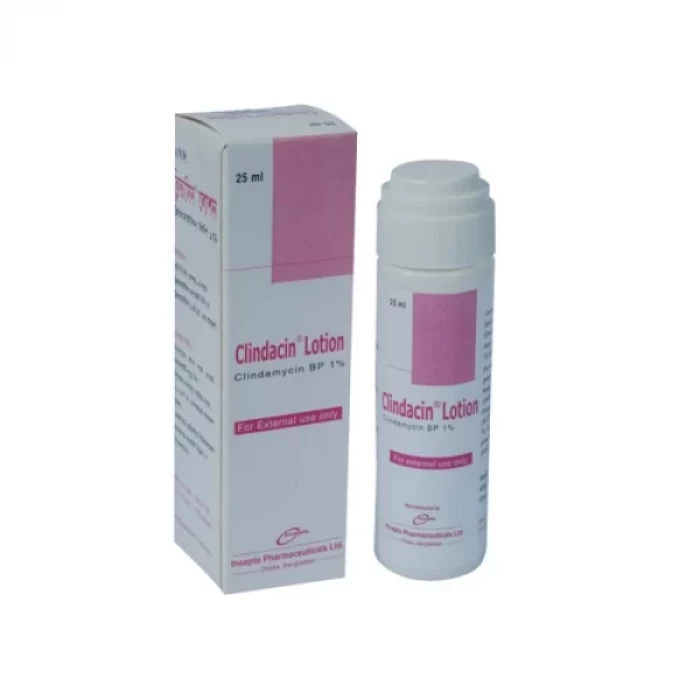


Climycin 300mg Capsule
Clindamycin is used for-
- Lower Respiratory Tract Infection
- Skin and soft tissue infections
- Stomach and intestinal infections
- Bacterial vaginitis
- Bone and Joint infections

🛒 How to order this item?

100% Genunie Product
Safe & Secure Payment
Secure & Effecient Delivery
Proper Packaging
Cashback offer(Optional):
 Coupon CASH55 ✔️ Get ৳55 back - for
Ordering ৳500+
Coupon CASH55 ✔️ Get ৳55 back - for
Ordering ৳500+ Coupon CASH120 ✔️ Get ৳120 back - for
Ordering ৳1200+
Coupon CASH120 ✔️ Get ৳120 back - for
Ordering ৳1200+ Coupon CASH200 ✔️ Get ৳200 back - for
Ordering ৳2500+
Coupon CASH200 ✔️ Get ৳200 back - for
Ordering ৳2500+ Coupon CASH300 ✔️ Get ৳300 back -
for Ordering ৳3500+
Coupon CASH300 ✔️ Get ৳300 back -
for Ordering ৳3500+ Coupon CASH400 ✔️ Get ৳400 back -
for Ordering ৳4500+
Coupon CASH400 ✔️ Get ৳400 back -
for Ordering ৳4500+ Coupon CASH500 ✔️ Get ৳500 back -
for Ordering ৳5500+
Coupon CASH500 ✔️ Get ৳500 back -
for Ordering ৳5500+- 🔹 Delivery charge is applicable for Cashback offer
- 🔹 Foreign manufacturer products are not applicable for Cashback offer
Show More
 Cash on Delivery - All over Bangladesh
Cash on Delivery - All over Bangladesh Urgent Delivery - 2 Hours Dhaka City
Urgent Delivery - 2 Hours Dhaka City ফ্রি ডেলিভারি! - ৯৯৯ টাকা+ অর্ডারে ঢাকা
শহরে ।
ফ্রি ডেলিভারি! - ৯৯৯ টাকা+ অর্ডারে ঢাকা
শহরে । ফ্রি ডেলিভারি! - ২৪৯৯ টাকা+ অর্ডারে ঢাকার
বাহিরে ।
ফ্রি ডেলিভারি! - ২৪৯৯ টাকা+ অর্ডারে ঢাকার
বাহিরে ।
Description:
Climycin 300mg Capsule contains Clindamycin, an antibiotic used to treat certain serious bacterial infections. Symptoms of these infections may include fever, fatigue, headache, nausea, vomiting, and swollen lymph nodes.
Before taking Climycin 300mg Capsule, inform your doctor if you have a history of stomach or intestinal issues (such as bowel disease or diarrhea), hay fever, asthma, eczema, intolerance to certain sugars, or kidney, or liver problems. Pregnant women should use Climycin 300mg Capsule with caution and consult their doctor before taking it.
For breastfeeding women, Climycin 300mg Capsule is generally not recommended. Common side effects may include diarrhea, stomach pain, and abnormal liver function tests. If symptoms worsen or persist, consult your doctor.
Safety Advices

Alcohol
UNSAFE
Consuming alcohol with Climycin 300mg Capsule does not cause any harmful side effects.

Pregnancy
UNSAFE
Climycin 300mg Capsule should be used with caution in pregnant women or women planning to have a baby as it crosses the placenta. It will be given to you by the doctor only if it's clearly necessary. Consult your doctor before taking Climycin 300mg Capsule.

Breastfeeding
UNSAFE
Climycin 300mg Capsule is not recommended for use in breastfeeding women as it may pass into breast milk. Consult your doctor before taking Climycin 300mg Capsule.

Driving
CAUTION
Climycin 300mg Capsule does not affect your ability to drive or use machines.

Kidney
CAUTION
Climycin 300mg Capsule should be used with caution in patients with severe kidney disease. Your doctor will give the right dose depending on your age, body weight, and disease condition. Consult your doctor before taking Climycin 300mg Capsule.

Liver
CAUTION
Climycin 300mg Capsule should be used with caution in patients with severe liver problems. Your doctor will give the right dose depending on your age, body weight, and disease condition. Consult your doctor before taking Climycin 300mg Capsule.
Uses of Climycin 300mg Capsule
- Treats Severe Bacterial Infections
How does Climycin 300mg Capsule work?
Climycin 300mg Capsule works by stopping the bacterial protein synthesis that is essential for its growth. Thus it kills or stops the growth of bacteria.
Side Effects of Climycin 300mg Capsule
- Headache
- Black or tarry stools
- Nausea and vomiting
- Chest pain
- Diarrhea
- Stomach pain
- Fast heartbeat
- Muscle or joint pain
- Loss of appetite
- Increased thirst
- Skin rash
Quick Suggestions:
- Your doctor has prescribed Clindamycin to cure your infection and improve symptoms.
- Do not skip any doses and finish the full course of treatment even if you feel better. Stopping it early may make the infection come back and harder to treat.
- Take it with food to avoid an upset stomach.
- Diarrhea may occur as a side effect but should stop when your course is complete. Inform your doctor if it does not stop or if you find blood in your stools.
- Inform your doctor if you are pregnant or breastfeeding before you start treatment with this antibiotic.
- Stop taking Clindamycin and inform your doctor immediately if you develop an itchy rash, swelling of the face, throat, or tongue, or breathing difficulties while taking it.
Indication of Climycin 300mg Capsule
Clindamycin has been shown to be effective in the treatment of the following infections when caused by susceptible anaerobic bacteria; susceptible strains of the gram-positive aerobic bacteria eg, streptococci, staphylococci, and pneumococci; and susceptible strains of Chlamydia trachomatis.
- Upper respiratory infections include tonsillitis, pharyngitis, sinusitis, otitis media, and scarlet fever.
- Lower respiratory infections include bronchitis, pneumonia, emphysema, and lung abscess.
- Skin and soft tissue infections include acne, furuncles, cellulitis, impetigo, abscesses, and wound infections. For specific skin and soft tissue infections eg, erysipelas, and paronychia (parasitism), it would seem logical that these conditions would respond very well to Dalacin C therapy.
- Bone and joint infections including osteomyelitis and septic arthritis.
- Gynecological infections including endometritis, cellulitis, vaginal cuff infection, tubo-ovarian abscess, salpingitis, and pelvic inflammatory disease, when given in conjunction with an antibiotic of appropriate gram-negative aerobic spectrum in cases of cervicitis due to Chlamydia trachomatis, single-drug therapy with clindamycin, has been shown to be effective in eradicating the organism.
- Intra-abdominal infections including peritonitis and abdominal abscesses when given in conjunction with an antibiotic of the appropriate gram-negative spectrum.
- Septicemia and Endocarditis: The effectiveness of Dalacin C in the treatment of selected cases of endocarditis has been documented when Dalacin C is determined to be bactericidal to the infecting organism by in vitro testing of appropriate achievable serum concentrations.
- Dental infections eg, periodontal abscess, and periodontitis.
- Toxoplasmic encephalitis in patients with AIDS. In patients who are intolerant to conventional treatment, clindamycin in combination with pyrimethamine has been shown to be efficacious.
- Pneumocystis jiroveci (previously classified as Pneumocystis carinii) pneumonia in patients with AIDS. In patients who are intolerant to, or do not respond adequately to conventional treatment, clindamycin may be used in combination with primaquine.
- Malaria including multi-resistant Plasmodium falciparum, in combination with quinine.
- Prophylaxis of endocarditis in patients sensitive/allergic to penicillin(s).
- Prophylaxis of infection in neck and head surgery. Clindamycin phosphate diluted in normal saline is used as an intraoperative irritant in the surgical field.
- Clindamycin phosphate when used concurrently with an aminoglycoside antibiotic eg, gentamycin, or tobramycin has been shown effective in preventing peritonitis or intra-abdominal abscess after bowel perforation and bacterial contamination secondary to trauma.
- In vitro susceptibility to clindamycin has been shown for the following organisms: B. melaninogenicus, B. disiens, B. bivius, Peptostreptococcus spp, G. vaginalis, M. mullieris, M. curtsii and Mycoplasma hominis.
Pharmacology
Clindamycin is an antibiotic that inhibits protein synthesis in bacteria. It works by binding to the 50S subunit of the bacterial ribosome, which interferes with the transpeptidation and translocation reactions. This disruption in protein synthesis leads to the inhibition of bacterial growth and eventually causes the death of susceptible organisms. As a result, Clindamycin is effective in treating various bacterial infections.
Dosage & Administration of Climycin 300mg Capsule
The recommended dosage of Clindamycin capsules depends on the severity of the infection:
- Serious Infections: 150 mg to 300 mg every six hours.
- More Severe Infections: 300 mg to 450 mg every six hours.
To prevent esophageal irritation, it is advised to take Clindamycin capsules with a full glass of water.
Studies have shown that the 300 mg capsule of Clindamycin provides plasma concentrations over the MIC90 (the minimum inhibitory concentration required to inhibit the growth of 90% of bacteria) for more than 12 hours. This finding supports the twice-daily dosing of Clindamycin 300 mg capsules, especially in skin and soft tissue infections (SSTIs) and respiratory tract infections (RTIs). However, in the case of bone and joint infections and diabetic foot infections, the dose of Clindamycin should be 300 mg capsule taken 3-4 times daily. The dosing regimen may vary depending on the severity and type of infection, so it is important to follow the specific instructions provided by the prescribing doctor.
Interaction
- Enhances Neuromuscular Blocking Agents: Clindamycin can enhance the action of neuromuscular blocking agents like atracurium, leading to increased muscle relaxation.
- Antagonizes Parasympathomimetics: Clindamycin may counteract the effects of parasympathomimetic drugs, which are drugs that stimulate the parasympathetic nervous system.
- Competitive Inhibition: Clindamycin can competitively inhibit the effects of certain antibiotics like macrolides, ketolides, streptogramins, linezolid, and chloramphenicol.
- Affects Coagulation Tests: Clindamycin may cause increased coagulation tests, specifically prothrombin time/INR (International Normalized Ratio), and may lead to bleeding when used with vitamin K antagonists like warfarin, acenocoumarol, and fluindione, which are blood-thinning medications.
Contraindications
Clindamycin should be contraindicated in patients who were previously sensitive to clindamycin or any component of the drug.
Pregnancy & Lactation
During pregnancy, clindamycin use during the second and third trimesters has not been associated with an increased frequency of congenital abnormalities based on clinical trials with pregnant women. However, there are no adequate and well-controlled studies on pregnant women during the first trimester. Therefore, clindamycin should be used during the first trimester of pregnancy only if clearly needed, and its use should be carefully considered.
Clindamycin has been reported to appear in breast milk at concentrations ranging from 0.5 to 3.8 mcg/mL. It has the potential to cause adverse effects on the gastrointestinal flora of breastfed infants. If oral or intravenous clindamycin is required by a nursing mother, it is not a reason to discontinue breastfeeding, but an alternate drug may be preferred. The infant should be monitored for possible adverse effects on the gastrointestinal flora, such as diarrhea, candidiasis (thrush, diaper rash), or, rarely, blood in the stool, indicating possible antibiotic-associated colitis.
The decision to use clindamycin during pregnancy or while breastfeeding should be based on a careful evaluation of the potential benefits and risks. The developmental and health benefits of breastfeeding should be considered along with the mother's clinical need for clindamycin and any potential adverse effects on the breastfed child from clindamycin or from the underlying maternal condition. It is essential to consult with a healthcare provider before using clindamycin during pregnancy or while breastfeeding.
Precautions & Warnings
- Clindamycin should be used with caution in patients with renal and hepatic diseases, during pregnancy, and while breastfeeding. It may also require careful consideration in patients with gastrointestinal (GI) disease, the elderly, females, neonates, and atopic patients.
- Regular monitoring of blood counts, liver function, and kidney function is recommended during clindamycin therapy to ensure safety and efficacy.
- Regarding lactation, clindamycin is excreted in breast milk. The manufacturer suggests discontinuing the drug or not nursing while taking clindamycin. However, the American Academy of Pediatrics (AAP) Committee states that clindamycin is compatible with nursing. The decision to continue or discontinue breastfeeding while using clindamycin should be made based on consultation with a healthcare provider, considering the benefits of breastfeeding and the potential risks of drug transfer to the breastfed infant.
Storage Conditions
Store Climycin 300mg Capsule below 30°C temperature in a clean and dry place. Keep this medication out of sight from children and pets.
Disclaimer:
ePharma sole intention is to ensure that its consumers get proper
information as musch as possible. Although we do not guarantee the
accuracy and the completeness of the information that provided and
here information is for informational purposes only.
The information contained herein should NOT be used as a substitute
for the advice of a qualified physician. This may not cover
everything about particular health conditions,
lab tests, medicines, all possible side effects, drug interactions,
warnings, alerts, etc. Please consult your healthcare professional
and discuss all your queries related to any disease or medicine. We
intend to support, not replace, the doctor-patient relationship.
Pricing Information, Availability:
ePharma reserves the right to make adjustments to pricing,
Products and Service offerings for reasons including, but not limited
to,
changing market conditions, Product discontinuation, Product
unavailability,
manufacturer price changes, supplier price changes and errors in
advertisements.
All orders are subject to Product availability and the availability of
Personnel to perform the Services.
Therefore, Seller cannot guarantee that it will be able to fulfill
Customer’s orders.
If Services are being performed on a time and materials basis, any
estimates provided
by Seller are for planning purposes only.

Heat stroke risk now a days












